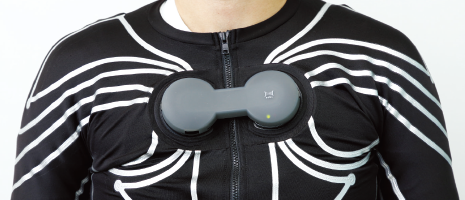Home > Highlighting JAPAN > Highlighting Japan January 2019 > Science & Technology
Highlighting JAPAN


Smart Apparel That Tracks Your Vital Signs and How You Move
A textile-based wearable device with stretchable sensors and circuits, “e-skin” monitors your movements and vital data. The smart apparel made using this technology has exciting potential in gaming, fitness, disease prevention and various other fields.
The smart apparel “e-skin” is a wearable sensor that recognizes your physical movements. While preexisting VR gaming technology requires cameras to capture motion, e-skin is camera-free, which enables the device to register motion and track you outdoors and in other places where it is difficult to set up cameras.
Beyond the gaming realm, e-skin technology will be useful for a vast range of applications, including analyzing form in sports and fitness; monitoring the movements, posture and respiration of babies and the elderly while they sleep; and keeping an eye on the wearer’s overall health. Dedicated software makes it possible for users to crunch the data the device obtains according to their needs.
“In the initial stage of developing the device, we thought it would mainly be used in gaming, so receiving more inquiries from industries outside of gaming was unexpected,” says Ichiro Amimori, co-founder and CEO of Xenoma, the company developing it. “There has been much interest in using e-skin to improve workplace safety for people such as factory workers and truck drivers by monitoring their respiration and posture. We’re planning an experiment on tracking the posture of care workers to find ways to prevent backaches.”
Professor Takao Someya of the Department of Electric and Electronic Engineering at the University of Tokyo developed the stretchable electronics technology e-skin is based on. Xenoma is a venture company created to find practical applications for his research results, the most famous being an organic sensor sheet that can be directly attached to your skin. Amimori, however, focused on his stretchable electronics technology and the potential for intelligent clothing.
e-skin’s ultra-thin flexible circuit consists of multiple stretchable sensors that can be altered to suit the user’s purpose. A part called the “Hub,” positioned on the chest, features an accelerometer and a gyro sensor, and is also Bluetooth-equipped, allowing it to send data to smartphones and computers. The Hub can be detached and charged by connecting it to a micro-USB cable.
The product is elastic as well as highly durable and waterproof, so the wearer can sweat and it can be machine-washed just like normal clothing with no ill effects. Since twisting and stretching the sensors presented a greater challenge than getting the sensors wet, e-skin has been modified to endure repeated use, surviving 100,000 durability tests.
“e-skin turned innovative technology into something with a practical use. However, we made such massive improvements during product development that the final product no longer resembles its original form,” explains Amimori, thinking back on the process. “For example, the original sensor used organic solvents in the sensor ink that cannot be used in apparel factories, so we switched to water-based ink instead. Unless the product can be made using preexisting production facilities, it will not become widely available. We optimized the production method, something which academia tends to overlook.”
Xenoma is now developing sensing wear for dementia patients that constantly monitors their respiration, heartbeat and skin temperature, and also captures physical motion data if they fall over. The company aims to expand its targeted customer base beyond specific groups of people like athletes and dementia patients to every individual. In the future, smart apparel would monitor everybody’s day-to-day vital signs.
Amimori’s vision for e-skin is far-reaching. “From the perspective of social value, we should be thinking about preventive medicine,” he explains. “Constant monitoring of vital signs will allow the gathering of big data that is medically meaningful—for instance, it may lead to pinpointing symptoms immediately before the onset of a stroke—as well as improved individualized healthcare.”
Xenoma has already received inquiries from medical institutions overseas, so e-skin has taken the first steps to becoming a new preventive medical device around the world.
© 2009 Cabinet Office, Government of Japan







